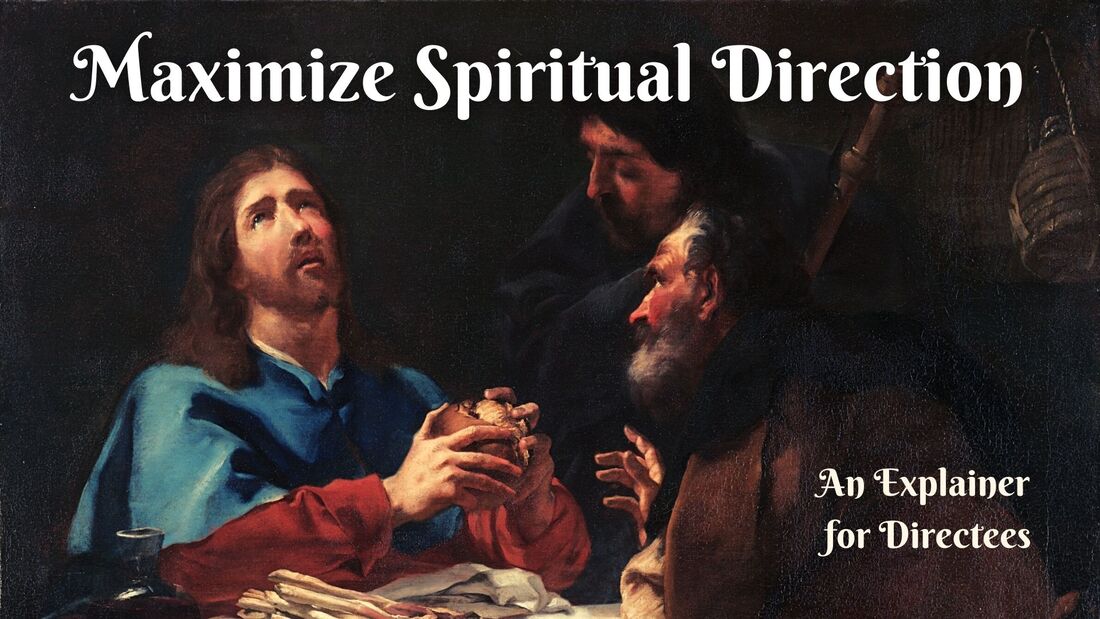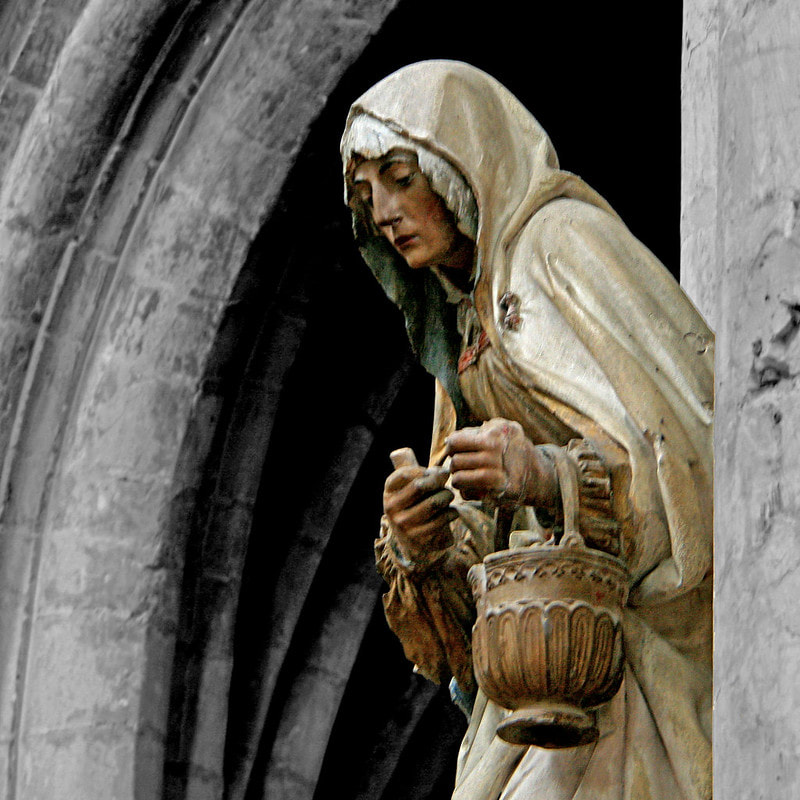|
The phrase, “I did all the things,” keeps surfacing everywhere. Ironically, the Lord said that only, “one thing is necessary” (The Holy Bible, ESVCE, 2017; Lk. 10:42). In this Scripture, Martha was “burdened with much serving” and “anxious and worried about many things” (Lk. 10: 40-41). She is our mirror in times of desolation and false consolation (Ignatius, SpEx #317, 332). Are we not burdened by the many responsibilities on our never ending “to-do” list that weigh upon tried shoulders in a world spinning faster and faster? Are we not anxious and worried by the trials of life that inevitably visit us while alarming events haunt us? What is this one thing? This one thing is choosing to be with Him, to know His Heart, to enact His Will (as passive or as active as that might be) (Mt. 6: 10). My Friends,
A very Merry Christmas and Happy 2023 to you all! My prayer is that you seek Him, find Him, become Him, and proclaim Him in a world that needs Him more than ever. To know Him, love Him, and serve Him is the purpose and joy of our lives! As inner healing and growth in holiness happens, we experience for ourselves the generous and merciful Father who rushes out to meet us and promises us everything He has. Let’s give a resounding “yes” to Him in this new year, through the intersession of Mother Mary whose fiat wrought so great a Savior. During this Christmas season and year of Eucharistic Renewal, consider this reflection from Peter Kreeft in Food for the Soul, What did Jesus leave the world that it did not have before? We still have death, and sin, and suffering, and wars, and diseases, and wickedness. How did Jesus change the world? What did Jesus give us that we didn’t have before? The answer is as simple as a lightning bolt. We have God. God in person, God incarnate, God in the flesh. We have the eternal son of God who was made man and who suffered and died and rose for our salvation and who is still here, all of him, Body and Blood, Soul and Divinity, hiding behind the appearances of bread and wine in the that little tabernacle and made present on the altar by this own miraculous power, using words that come from the lips of a priest who is a sinner just like you. And you are invited to receive him not just into your soul but also into your body…O come let us adore him. That’s what Christmas is about” (2022, p.46). If you are looking for personal or group resources for the new year, these are a few that have come to my attention and that I recommend: Fr. Mike Schmitz’s Catechism in a Year podcast; Supernatural Saints: A School of Ministry from the Saints by Patrick Reis and Fr. Matthias Thelen; Jesus I Trust in You: A 30-Day Personal Retreat with the Litany of Trust by Sr. Faustina Maria Pia, S.V.; short but excellent videos on the spiritual life by Matthew Leonard at Science of Sainthood; and more practical growth (podcasts, human formation groups, counseling) with Souls and Hearts. As well, if you have never been on a retreat or it has been a while, please consider looking into this and prioritizing time away with just the LORD. Remember, He is found in silence, prayer, asceticism, preference for the poor and vulnerable (often within our family/community), and fulfilling the Lord’s will in daily life. Discern well, my friends, and rejoice in the LORD always. A Mass is being offered for all my directees, retreatants, and supervisees this Christmas season. May Christ Be Born Anew, Rachel Gehring Dear Friends,
A couple times a year, my “lights” newsletter is primarily sharing resources that might help you grow spiritually, navigate relationships, and discern events. In case any of this is helpful to ponder, enjoy. Be sure to check out a final thought on summer weeds and wheat at the end. Spiritual direction resembles the Emmaus story (Lk 24: 13-35). Everyone knew about His crucifixion, but rumors percolated among the disciples — that the tomb was empty. Discouraged and confused, two disciples walk away from Jerusalem when Jesus draws along side and walks with His friends, who fail to recognize Him. A few questions here, a little instruction there, many shared steps and lots of listening bud a trust and curiosity that impels them to ask Jesus to stay with them. All Jesus needed was an invitation! He goes in, and at table, takes the bread, breaks it, and gives it to them, whereupon their eyes are opened, and Jesus vanishes. Reflecting on and discussing the day, they ask each other, “were not our hearts burning within us as he spoke to us on the way?” Encouraged, these two rerouted back to Jerusalem, proclaiming the Good News, that “the Lord has truly been raised” to the infant Christian community. The spiritual director is to be like Jesus, spiritual direction to bear similar fruit, and the directee to maximize the encounter like the disciples did. This explainer offers five words to help directees get the most out of spiritual direction. For the intentional believer, Lent rightly tends to be a time of purposeful change. The liturgical calendar invites us to enter the desert with our Lord and take an axe to those things are separating us from him. If our life is not bearing much good fruit, perhaps we need to look at our roots. Deep in our hearts, we know that sin separates us from the Lord, that we cannot fellowship with sin and the Holy Spirit at the same time. If we desire intimacy with Him, we must allow our hearts to be convicted, purified, and transformed. We agree to soul searching, house cleansing, and deep healing in order to be closer to the One we love and Who deserves our single hearted worship. While there can be different ways of tackling this topic, we will look at what the Catholic Christian tradition has long identified as the “three root sins,” around which other sins “cluster” and “grow.”
Scriptural basis for these root sins can be found in Genesis 3: 6 and 1 John 2: 16. “The woman saw that the tree was good for food, pleasing to the eyes, and was desirable for gaining knowledge. So she took some of its fruit and ate it; and she also gave some to her husband, who was with her, and he ate it” (Genesis 3:6). “For all that is in the world, sensual lust, enticement for the eyes, and a pretentious life, is not from the Father but is from the world (1 John 2: 16).” A study and matching of these passages reveals pride, vanity, and sensuality. What power do we give to this sin when it is unidentified and runs unchecked? We know we have an enemy, but do we know his plan of attack? Maybe it’s time to hatch a strategic battle plan through the wisdom and power of the Lord. While we all have pride, vanity, and sensuality to a certain extent, growing self knowledge will reveal one of these as predominant (be sure to look at "the reason" you do what you). Dear Friends,
Happy 2022! My scheduling link is ready to go (I hope!). All spiritual directions, nineteenth annotations, and pastoral supervisions can be scheduled/rescheduled and sliding-scale stipends offered on my website under the scheduling page: https://www.transformedbymercy.net/scheduling.html. Please contact me me if you have problems, and I can walk you through this. Thank you for your patience, as this should be easier for everyone. I want to highlight and recommend a few books for 2022. The first is Fr. John Riccardo’s book Rescued. This book is the best telling of the Good News I have heard to date – the audible version, read by Fr. John himself, is outstanding - my first recommendation for the year. Second, because the liturgy and Vatican II tend to be at the forefront of conversations, at least in serious Catholic circles, consider some formation in this area with Reclaiming Vatican II, a balanced, well-researched attempt to dialogue and look honestly at a topic that is, unfortunately, dividing those of us who need to stand together during these difficult times. Third, if you are looking forward to Lent, consider this devotional on healing called Restore by Sr. Miriam James Heidland, SOLT. The popularity of devotionals lies in the integration of formation and prayer – which means spiritual growth. God bless you on these memorials of St. Francis De Sales and the Conversion of St. Paul. This September, let's spin off of Theology of the Body to look at labor and then dive into the anchor of our souls. We might adapt TOB terms to unpack the meaning of labor...
Dear Friends,
Can you believe we are rounding out the summer of 2021? I hope that despite the heat waves, smoke screens, and COVID uptake, this was restful time. Following the graduation of my 18 year old and 22 year old in May, as well as teaching a 400 class on discernment and assisting with a 300 residency for those seeking certification in spiritual direction, I spent June/July focused on family and several dear friends whom I accompany in the nineteenth annotation. Moving into fall, I want to share a few resources with this caveat: linking does not mean that I support the author or organization in entirety, but these resources on (1) Things I Learned in Spiritual Direction, (2) Being Devoted to One Another in Marriage, and how Current Events Invite (3) Trust, and (4) Simplicity may be pertinent and helpful. Ten years ago, I sat in the back of a Florida conference room waiting for Fr. Andrew Apostoli, CFR, to talk on the seven gifts of the Holy Spirit in relation to St. Teresa of Avila’s Interior Castle. When he spoke his first three words, “The Holy Spirit…,” grace surprisingly and tangibly fell over me, and I started sobbing. My life had already been given over to the Lord. Yet, there was MORE! Something or Someone essential had been absent in my spiritual life…now, I knew it! Since then, I have pondered what this all meant, especially upon learning that some theologians see the Holy Spirit as the “forgotten Person of the Trinity.” Dear Friends,
May you have blessed Holy Week. Considering the timing, let’s imagine the forgiving heart of Jesus from his passion through his ascension. As he hung on the cross, the very people he created, loved, and saved tortured him: either directly by their insults, spit, and physical violence (the soldiers), or indirectly, by their failure to accompany him in his worst moments (the apostles). Jesus cried, "Father, forgive them, they know not what they do" (Lk 23: 24, NABRE). On Easter morning, he miraculously entered the locked room, where the disciples huddled in fear and confusion, and said, "Peace be with you" (Jn 20: 19). Jesus' forgiveness prompted an impartation of peace followed by a challenge. The three times Jesus asks Peter if he loves him are "redue" opportunities for his three betrayals (Jn 21: 17). Jesus sets the stage for our understanding of authentic forgiveness, which means knowing what forgiveness is and isn't. Forgiveness is...
I am the Lord your God. You shall not have strange gods before me. Do I honor God? Do I pray to God every day? Have I thanked God for His gifts to me? Has God and the pursuit of sanctity in Christ been the goal of my life? Have I made something else in my life more important than God: money, work, alcohol, smoking, drugs, my phone, online gaming, or vacation? Do I place myself above God? Have I tried to use magic or divination or other occult practices and tools? Dear Friends, Because the question of “how to pray” comes up so often in spiritual direction, I want to offer my own explainer on beginning interior prayer. The Catechism of the Catholic Church speaks of three types of prayer: vocal (memorized prayers, typically prayed out loud), meditative (called discursive or mental, as it prioritizes active thinking), and contemplative (a word with many definitions, though generally passive and heart based) (#2699). Notice the progression. This instruction is for beginners or those moving into meditative prayer since those advanced in prayer need different advice. The word “interior” is preferable to “mental” because it facilitates the transition from head to heart as St. Theresa of Avila’s indicated with her treatise on prayer, The Interior Castle. Prayer is paying attention to God and intentionally spending time with Him. It is a dialogue, or mutual listening and speaking about what matters most. Try 7Rs to begin interior prayer:
Dear Friends, This year, LENT starts on Ash Wednesday, February 17th. We may come to this penitential season with mixed thoughts and feelings, such as anticipation to tackle an issue the LORD has spotlighted, with dread because of a historical failure to keep resolutions, or a simple desire to grow in friendship with Christ. A faithful friend doesn’t leave when the going gets rough, but enters into, walks with, is present to, and gives real assistance. In this case, it’s Jesus who invites deeper intimacy throughout these 40 days, reminiscent of the Israelites' journey through the desert from the slavery of Egypt to the promised land of Canaan, and of His own confrontation with the enemy in the desert following His baptism. Traditionally, the Church encourages prayer, fasting, and almsgiving during Lent. If this seems stale and we are stuck along the way, reconsider Lent’s “Triple A” roadside insurance for the journey:  Abide. To pray is to abide in the Lord who wishes to abide in us (Jn 15: 4). How are we, specifically, called to grow in prayer? Some are good at setting aside time to pray but fail to communicate with Him always…and visa versa. “Abide” in Scripture means to dwell together, to rest in, to remain connected, to attend and wait upon. It is likely that we are called to practice the presence of God in the moment and with the person in front of us, or that we are called to set aside some time for a more meditative or contemplative prayer, rather than rote prayers. We may consider spiritual reading or just sitting in silence. Abiding doesn’t allow hiding: be real with the LORD. Abide in the vine by receiving His life-giving grace. Dear Friends,
2021 is here and under the patronage of St. Joseph according to Pope Francis, who desires that “every member of the faithful, following his example, may strengthen their life of faith daily in the complete fulfillment of God’s will.” St. Joseph, guide our discernment and obedience to the Word spoken over our lives, show us the way when life seems confusing, strengthen us for the ordinary and extraordinary tasks ahead, and make our hidden lives holy. This new year, please consider a few spiritual podcasts to nourish your soul. Typically, I do not make at-large recommendations because people often need such different things, but I believe these short podcasts may be particularly helpful:
Finally, let us remember that remaining in His peace is a primary obligation (Fr. Jacques Philippe). We live in turbulent times, but our hearts can still be anchored in the loving presence of God and fundamentals of our faith. Please beware of the various news sources (Catholic and otherwise) that you are taking in and how much time you give to these. There are situations that we must confront, but in the Spirit of Christ, not the spirit of fear, confusion, or anger. We ask to be under His Wise and Mighty Lordship and make space for Him through heartfelt prayer, weekly adoration and the sacraments (where available), charity and truth in every interaction, and trustful surrender. God bless you! One morning, as we carried out our morning lectio divina before school, the topic of repentance came up. We had been reading the Scripture of Luke 7: 36-50 called “The Pardon of the Sinful Woman.” Unlike the Pharisee who invited Jesus to dinner, the unwanted, unworthy, and unexpected woman lavished Jesus with love. She cried all over his feet, wiped them with her hair, and anointed them with perfume. Criticized by the Pharisee, Jesus told a parable that focused on the degree of love in proportion to the amount forgiven. Frequent, sacramental confession is essential for those who desire to grow in holiness and is necessary for salvation. The Catechism of the Catholic Church states, “Individual and integral confession of grave sins followed by absolution remains the only ordinary means of reconciliation with God and with the Church” (§1497). Yet, what if one honestly can’t get to confession because of COVID restrictions and the priest shortage (creating impossible confession times and long lines in which one may not get in at all)? As a family we discussed that in this case, we should express contrition for our sin directly to the Lord and trust in His merciful forgiveness even as we plan to get to sacramental confession ASAP. “Kinda like a spiritual communion but a spiritual confession, instead?,” queried one of the kids. What a brilliant analogy! (If a spiritual communion is new to you, this is a prayer expressing desire to receive sacramental communion while trusting in similar graces since that wasn’t possible. Here are several versions of a spiritual communion.) This mirrors Pope Francis’ recommendation this past spring. If necessary, consider writing your own spiritual confession until you get to sacramental confession. Unite yourself with others throughout the world who don’t have regular access to the sacraments and trust in His divine mercy and abundant grace right where you are right now! Here's one option:
While only a tool, journaling is an important one that may offer significant spiritual breakthrough and development. You may want to sit with and ponder the following Scripture: “I will stand at my guard post, and station myself upon the rampart, I will keep watch to see what he will say to me, and what answer he will give to my complaint. Then the LORD answered me and said: Write down the vision; Make it plain on tablets, so that the one who reads it may run. For the vision is a witness for the appointed time, a testimony to the end; it will not disappoint. If it delays wait for it, it will surely come, it will not be too late” (Habakkuk 2: 1-3). While there are many schools of thought on prayer journaling, such the Ignatian concept of journaling only after prayer so as not to interrupt what is happening between you and the Lord, you may want to remember that prayer is a sacred conversation with the living, mysterious, and relational God.
The Examen is differs from the examination of conscience (inventory of sins before confession). The Ignatian Examen (SpEx #43) was renewed with the contribution of the “Consciousness Examen” by George Aschenbrenner, SJ in 2007. He explained how to connect the Examen to discernment of spirits through examining consciousness of inner movements of soul because: “What is happing in our consciousness is prior to…our actions.” The Examen targets the root of sin and sanctity by forming a “discerning heart.” It’s important to consider the “interior feelings, moods, and slightest urges” rather than avoid them. The goal is not to follow every prompting, but to enter deeper and deeper levels of the soul to be drawn by God alone in the still point of the heart. This Examen includes the 5 Keys of Unbound by Neil Lozano since the 5 Keys offers practical tools to assist conversion and entrustment as you see below. Remember, the name of Jesus invokes His Presence and His Power. Finally, the acronym of G.R.A.C.E. helps you remember the 5 steps of the Ignatian Examen, which takes roughly 10 -15 minutes. Consider journaling important findings. Gratitude: Count your blessings. Gratitude wards off discouragement and honors God’s goodness, in good times and bad, because everything is grace. Request: Request light to see your day from God's perspective since His vision is true and penetrating. There is primacy to the spiritual life: God starts, you respond. Account: Take account of your day by seeing what God brings to your attention (either positive or negative). This is not an inventory, but a revelation of one or two things to focus on with the Lord. Revisit what the Lord shows you, not just the event (thought, word, or deed – omission or commission) but the underlying feeling which is linked to a (true or false) belief. What patterns do you see? Conversion: Return to the Lord. For those positive responses, give Him glory and praise. For those negative responses, and as needed, it may be helpful to utilize Keys 1-3 of Unbound because you want to break all fellowship with sin, unforgiveness, and other bondages of the enemy: (1) Repent by saying out loud, “In the name of Jesus, I am sorry for ________.” (2) Forgive by saying out loud, “In the name of Jesus, I forgive ___name___ for ___ describe it___.” (3) Renounce by saying out loud, “In the name of Jesus, I renounce the spirit of ___ label it ___ (Ex. gluttony, powerlessness, lust, worthlessness, etc.) Entrust: Ask for the grace to improve tomorrow and proactively consider a plan of amendment. Entrust all this to the Lord, which is coming back into right relationship with Him. Savor His love for you! Perhaps, utilize Keys 4-5 here: (4) Reclaim the dignity and power that belongs to you as His adoptive son / daughter, that is a priest, prophet, and king. Take authority in His name. Say out loud, “In the name of Jesus, I reclaim authority _________.” (5) Accept His blessing. God is Good all the time. Allow Him to bless you by receiving and accepting it. Live in His love. Say out loud, “In the name of Jesus, I accept the Father’s blessing of _________________.” The Power of Silence: Against the Dictorship of Noise by Robert Cardinal Sarah
is excellent for meditation and spiritual reading. It can be applicable for everyone and is divided into short numbered paragraphs. 2. At the heart of man there is an innate silence, for God abides in the innermost part of every person. God is silence, and this divine silence dwells in man. In God we are inseparably bound up with silence. The Church can affirm that mankind is the daughter of a silent God; for men are the sons of silence. Are you paying attention? It’s key to the spiritual life." By Sr. Aletheia Noble at Aletia.org on August 8, 2017. Thank you!
For a long time, I had believed and even took pride in the idea that I was a good listener. Recently, however, I learned that I am not as good of a listener as I had thought. I was sharing something personal with a friend, something I wouldn’t normally share with others, and she abruptly interrupted me to talk to another person. I felt shocked and hurt, but just as soon as I felt anger surging within me, I also realized that I had just seen myself in her distracted face. My friend’s inability to focus on what I was saying helped me to realize that my attention on others is often unfocused, too. This incident helped me to see in a very concrete way the connection between my undisciplined attention and my failure to love others and God. I recently read an essay by French philosopher and mystic Simone Weil in which she writes, “Prayer consists of attention.” After I read that sentence, I felt a shiver of shock run through me. If prayer is truly connected to our ability to pay attention, the implications are startling and immense, especially in today’s multi-tasking, fast moving, digital culture. Without learning how to pay attention, our lives become more and more fractured and distracted. And lack of focus in our everyday lives can translate to less fruitful prayer time, and ultimately prevent us from living a more contemplative life of union with God. First in a Series on Reclaiming the Ten Commandments for Our Times
by Fr. Roberty McTeigue, SJ on July 19, 2017 at Aletia.org. Thank you! There is an altar in the center of the human heart, and we can't bear for it to be empty. How do you know what your priorities are? One answer: Look at what has the first claim on your time, energy and money. How do you know what your priorities should be? That’s a different, harder, and more important question. I’ve been thinking about priorities since I recently saw a child, no more than 10, stop what she was doing, take out a small kit, and test her blood sugar. She has a robust form of diabetes and has to monitor herself to stay healthy. I was struck that this little girl, very calmly, unselfconsciously and matter-of-factly stopped what she preferred to be doing (playing with other children) to do what she knew she needed to do and must do. She’d been taught well a clear sense of priorities, to the degree that she could understand, and it seemed to me that she was taught in a way that would allow her to understand better when she was older. What if we taught our children (and ourselves!) about God that way? Each Lent, we accompany Christ on the way of the cross via prayer, fasting, and almsgiving but still skim the surface. Why not go deep and get real with the Lord? Sometimes, we just don’t know how. So, let’s learn from Jesus crucified how to be vulnerable before the Lord, which gives Him access to our hearts for our transformation and His glory. Neither a Scripture study nor a theological treatise, this simple reflection may facilitate a deeper relationship with the Lord. Since Jesus was like us in all things but sin (Heb. 4:15), He models prayer that is spiritually and psychologically healthy. In His darkest moment, when He is near death on the cross, He cries to His Father, “My God, my God, why have you forsaken me?” (Mt. 27:46). Here, Jesus teaches four elements of “honest prayer.”
1. He Articulates. Jesus says what He thinks, which beats dancing around an issue as if the Lord can’t handle our honesty. In fact, Jesus confronted His Father with His perception of reality. Transparency is safe because what happens in our lives really matters to the Lord. The Lord eagerly waits for us to accept and articulate our thoughts, feelings, and circumstances. While it can be difficult to figure out what is going on inside of us, the Lord loves it when we pray the truth of our lives. Facing our sin, fears, pain, and brokenness allows Him to meet us where we are at in order to lift us up. Isn’t this exactly where the enemy would like believers to be – in a shallow, pseudo relationship as if the Lord doesn’t care, listen, or respond? Yes, Jesus bothers His Father with what is on His mind and in His heart, without trying to impress Him. 2. He Feels. Jesus recognizes what He feels and includes this in His prayer. Parenting is a paradox. While we will need to give an account for what we have been entrusted with, the final product is not fully in our control. We are called to be good stewards, making a return on our children by putting our best foot forward. At the same time, there is freedom in releasing ultimate responsibility for our children into the hands of the Lord, who loves them more than we do. Even in the best of parenting situations, there are some inevitable and humbling gaps that God alone can fill.
The first gap is our own brokenness. I get frustrated when I see this seemingly endless discussion in certain Catholic circles about how women should dress. How long should the skirt be? Are skinny jeans appropriate? How much cleavage is allowed?
I also remember my sisters describing shopping for wedding dresses and the saleswoman assuming they were Mormons because they didn’t want a strapless gown or too much cleavage. They were really annoyed when only shown dresses with tiny sleeves that looked more like extended shoulder pads because that was the Mormon minimum but looked horrendous on them due to their shoulder shape. On Twitter I get sent a lot of “ask a priest” questions and about once a week the theme is modesty: is jogging as a date modest? Does listening to this song go against modesty? What about this hand gesture? Problems with the modesty lineUnfortunately so much of the discussion I hear or the phrasing of the questions I read is based on a misunderstanding of what modesty is. Modesty is not a line... "As a priest, people often talk to me about their lives and their problems. Inevitably, I ask them how their relationship with God is. I can usually tell from their response if they have a long-distance relationship with the Lord. The language they use reveals that a deep, personal friendship with God is somewhat of a foreign concept. For example, they’ll say, “Well, I say my prayers at night before I go to bed,” or “I go to church,” or, my favorite, “I talk to the Big Guy in the sky; we’re tight.”
Great. Saying prayers at night and going to church is a wonderful way to deepen our relationship with God. But saying prayers at night and going to church does not necessarily mean that we have a deep, personal friendship with the Lord either. And as for “talking to the Big Guy in the sky,” that’s simply not Christian spirituality; it’s deism. In fact, therein lay the problem: too many people think God is “out there somewhere” rather than very close to them. "The following article is adapted from Discovering God Together: The Catholic Guide to Raising Faithful Kids
Most people think that faith is something you either have or you don’t. But research by Emory University’s Dr. James Fowler revealed that faith evolves in discernible stages throughout our lifespan. At each stage, a person’s faith needs to be nourished in different ways if it is to grow and mature into the next stage. If we don’t receive the right kind of support, faith development can stall or even wither. Because Fowler viewed faith as a natural and essential part of every human person’s search for meaning, significance, and transcendence, Fowler’s Stages of Faith track with other developmental stages you might remember from your Psych 101 class, such as Erik Erikson’s Stages of Psychosocial Development and Lawrence Kohlberg’s Stages of Moral Development. What Stage of Faith are you at? And what do you need to do to more effectively continue your search for meaning, significance, and transcendence? STAGE 0: Primal Faith (Infancy)– People might be surprised to realize that babies have faith. It’s true that they don’t have a conscious experience of faith and can’t articulate specific beliefs, but this stage is tremendously important because it sets the stage for baby’s view of God and the world. If parents respond to baby’s needs promptly, generously, and consistently, baby learns the basic, gut-level sense of trust that is necessary to believe that when I call out, God will answer. If parents delay responding to baby’s cries, baby develops gut-level insecurity that anyone will respond when I cry out or that there is anyone to bother crying out to in the first place. |
Counselling Links |
























